The performance of Wuhan Mayor Zhou Xianwang during the 2020 Wuhan coronavirus epidemic is controversial. Some online reports claim that he is on the way out because of mismanagement of the early stages of the epidemic.
Hypothesis: Willing Perpetrator or Scapegoat Needed. Did Mayor Zhou Go Back on the Deal?
All this politics swirling around is more than a bit confusing. One reasonable hypothesis is that since this crisis has seriously embarrassed the Chinese Communist Party, the responsibles need to be removed smoothly to minimize the harm done to the Party. Effective scapegoating need a confession from the people involved. Here however Mayor Zhou is saying that I did nothing wrong, but I am willing to assume full responsibility, standing despised before all of history! What I care about most of all is the well-being of Chinese citizens threatened by the epidemic and all of humanity as well. P.S. Those officials in Beijing are responsible for concealing the seriousness of the epidemic early on!
Shifting responsibility is one of the highest forms of political art, seen of course in other countries as well. “I assume full responsibility ….. but I am not to blame!”
Mayor Zhou says that he was not able to release information about the epidemic to the public any earlier because of the provisions of the Law of the People’s Republic of China on the Prevention and Treatment of Infectious Diseases.
Having compared the Chinese and machine-translated text, I’d say that Google Translate does a fairly good job on this law. Not to legal standards certainly but enough to give a good idea what is and isn’t in the law and to muse on Mayor Zhou’s “the devil made me do it!” excuse. Here is Google Translate version of this PRC law.
More on this in a separate posting. The length got out of control! Here it is: The Law and Wuhan Mayor Zhou’s Excuse: I Followed the Rules, Blame Higher-Ups, Not me — the Law the PRC on the Prevention and Control of Infectious Diseases
Michael Anti, a Beijing-based Chinese commentator, made this comment about the broadcast interview with Chinese Central Television (CCTV) below.
Wuhan’s Mayor Zhou is very sly: he essentially is claiming that he concealed information about the epidemic because Chinese law requires authorization from higher authority before local government can release this information. Without permission, this information cannot be released. Zhou added that he made the decision to close Wuhan. Thus the correct decision was his; the error is because he was constrained by his superiors. Sly devil on live TV. This interview should go down in history.

[Transcript] CCTV Dong Qian interviews Wuhan Mayor Zhou Xianwang
January 27, 2020 15:31 Source: CCTV News
[Transcript] Chinese Central Television (CCTV) Dong Qian interviews Wuhan Mayor Zhou Xianwang.
This afternoon, Wuhan Mayor Zhou Xianwang walked into the front-line studio of Hubei Television for an interview with CCTV reporters! What arrangements have been made for hospital treatment in Wuhan? What is the procedure and what arrangements have been made for hospital admission of fever patients? Do you have enough physicians assigned to the hospitals? Can they meet present clinical needs? Please watch this live broadcast!
The following is the actual transcript:
Wuhan Mayor Zhou Xianwang walked into the front-line studio of Hubei Television for an exclusive interview with CCTV reporter Dong Qian. (14:51)
Host: First of all, I want to explain something as I broadcast live from this Hubei studio. You may ask, “Why aren’t you wearing a face mask since you are on the front-line in an epidemic area?” First of all, our studio at the Hubei TV station is strictly disinfected. In addition, I also consulted experts and said that in such a strictly disinfected space, and I confirm that these colleagues around me have not been to a hospital or if they have been in some hazardous places they have always worn a mask. Therefore, I am not wearing a mask during this live broadcast. However, as you can see, Mayor Zhou sitting next to me is wearing a mask. (15:10)
Zhou Xianwang: This is because the pneumonia caused by the new coronavirus has been confirmed to have spread from person to person. As the mayor, I must do a good job of prevention and control. I must take the lead in carrying out the necessary prevention and control according to the recommendations of experts. This include good personal hygiene habits including wearing masks when going out into public places. This is became a basic requirement once our prevention and control work got started. (15:13)
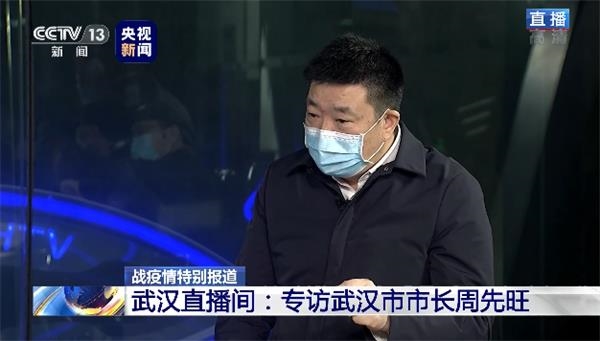
Host: Several days have passed since the roads out of Wuhan have been closed. What has been the effect? (15:16)
Zhou Xianwang: Now that the epidemic area of viral pneumonia of Wuhan is well controlled, we will be able to stop its continued transmission. The first priority in infectious diseases control is to control is to control the source of infection, and now fewer people are leaving Wuhan. This is currently our contribution to the country and to humanity. Therefore, we decided to close the roads out of Wuhan in accordance with the established procedures. Now that Wuhan citizens understand, it has had a good effect. The number of people leaving Wuhan has gone down significantly. There is no road out. The road closure was mandatory. That has been very effective in blocking the source of the infection. (15:18)
Host: The reason I ask this question is because when we look at the numbers, the number of confirmed cases from Wuhan and Hubei Province. The number of suspected cases now under medical observation is also increasing. What should we make of that? (15:29)
Zhou Xianwang: What is the relationship between the growth you just mention and our closing of the road out of Wuhan? I have no better idea than you do. We closed the roads out of Wuhan in order to reduce the possibility that infected people in Wuhan would could carry the infection with them out of Wuhan and infect other people outside. However, as for people who have already been infected in this area and have become ill, that number will not be affected by the closure of the roads out of Wuhan. Judging from the epidemiological pattern, we found the first case on December 27th. Tracking that case back to the beginning, we find that the first patient was hospitalized on December 12th. According to that cycle, we are now in a high incidence period, so the number of patients have increased accordingly at this time. That is in line with this pattern. (15:31)
Host: Mayor Zhou, when I was interviewing some medical staff yesterday, it became clear that the motor vehicle restriction are a real problem for the medical staff. When they commute to work, some medical staff may have to walk one or two hours or even longer between their homes and their hospital. Have you considered the practical problem that they are facing? How can these problem be solved and what pledges can you make to them? (15:32)
Zhou Xianwang: The purpose of motor vehicle restrictions is to block infectious diseases and reduce people’s mobility. Because we require home observation, those who do not have special circumstances should not go out, and those who do not have special circumstances cannot leave Wuhan, and people from other places should not come to Wuhan without special circumstances. Everyone should just be under observation at home. Infectious disease scientists long ago discovered that quarantine is the best policy. We limit the number of motor vehicles so that people will not go out. (15:34)
Zhou Xianwang: We have shuttle vehicles. After we stopped bus service, we divided up 310 large buses and assigned them to various street committees for them to manage. They can be used as transport vehicles vehicles. In addition, we have also assigned three to five taxis to each community. Their most important task is to serve the medical staff in their community. (15:35)
Host: They have priority. (15:47)
Zhou Xianwang: They have top priority. The next priority is to send free food, meals, and medical treatment to those who are inconvenienced by the necessity of observation at at home. Of course we are still working out the details and getting experience so this service is not yet ideal. (15:47)
Host: What kind of problems? (15:48)
Zhou Xianwang: For example, I allocated three to five cars to each community. Some drivers think that they can help you deliver food and meals, but can’t transport patients with fever. Some drivers believe that because they lack health expertise and so don’t want to take physicians back and forth. They respect them but they fear them. So they refuse to do it. This causes inconvenience to our medical staff. We are requisitioning some hotels near our hospital so that these medical staff will not get exhausted from commuting. (15:49)
Host: Is this best from the perspective of safety? (15:49)
Zhou Xianwang: It should be safe to do this. (15:49)
Host: That is, not allowing medical personnel to go between home and the hospital every day but to give them another place to live. Is that a safer arrangement? (15:49)
Zhou Xianwang: That should be true. (15:50)
Zhou Xianwang: These problems are gradually cropping up. New problems keep coming up but solutions come more slowly slowly so it is really not easy for our medical staff during this time. (15:51)
Host: This is about medical personnel. Looking at it from the perspective of the general public, the prevention and control of the spread of the epidemic is of paramount importance. However, some residents also have urgent need for normal medical treatment. How can you assure them that they will get it? (15:51)
Zhou Xianwang: Considering travel restrictions, we must try to meet normal medical needs as much as possible within the community. (15:51)
Host: Restrict the movement of people as much as possible. (15:51)
Mr. Zhou Xianwang: Yes, Prime Minister Keqiang also emphasized this point with us just now and the importance of observation at home. The necessary daily necessities can be satisfied, otherwise people will not be able to live at home, and if they cannot live there, the will go out, and so they will either infect other people or become infected themselves. (15:52)
Host: You are talking about fever. If someone has a fever but has not reached the fever criterion for treatment, they should do home observation first. (15:52)
Zhou Xianwang: It works like this. During this period the person’s status is not yet completely clear. Someone has a fever at home. After examination at the fever clinic, it turns out to be just a general headache and fever, and a common cold. Just observe it at home. If your illness does not develop further and the conventional cold therapy works, then you do not need to go to the hospital, just observe at home. The other case is if someone is not sick at all, but there is a danger of disease transmission all about. If they stay at home and rest. If they go out, they may get infected. Therefore, the ban on motor vehicles plays its role in this way. (15:52)
Host: If a woman is having a baby or an elderly person has a heart attack, how can we take care of their normal medical needs? (15:52)
Zhou Xianwang: Vehicles assigned to the community are used to solve these problems. In addition, we are still recruiting volunteers. Some communities with private cars have volunteers to organize a team to solve these unexpected problems. In addition, we have the 1-2-0 emergency [ambulance] response number vehicles as well but demand for them is very high right now. (15:54)
Host: For people on the outside, the events since January 23 up to the decision to close the road from Wuhan have all come very suddenly. Was it a very sudden decision? (15:55)
Zhou Xianwang: It was a very difficult decision to make. It came all of a sudden because the epidemic erupted suddenly. (15:55)
Zhou Xianwang: The epidemic came suddenly. For floods we get some warning from weather forecasts. Fires also erupt suddenly. As you are aware, we don’t have ready-made standards for these decisions. We didn’t have any remedial actions prepared. It came without warning. If we hadn’t take that drastic step, who knows what might have happened. Just think of what the great epidemics of history – the Black Death, Bubonic plague, and smallpox – have done to humanity. Deaths on an unimaginable scale. Will the pneumonia caused by this new coronavirus be like this? No one can say for certain. For now, the only thing for us to do is decisively closing of the doors and the gates of the city so that these people who may be infected will be kept enclosed within this circle so that they don’t go out to infect others. Each of us lives in our own homes within this circle. We don’t go out to infect others in this city. That is the reason for sealing off the city. (15:55)
Host: Certainly this is the best way to stop this disease from being transmitted, but Wuhan is a very large city with links to nine provinces. Especially with it coming at Spring Festival time, this must have given you a lot of pressure. (15:56)
Zhou Xianwang: Our Wuhan Communist Party Committee Secretary, Comrade Ma Guoqiang, is an entrepreneur. He thinks problems through more thoroughly than I do. However, when faced with this kind of problem, it can be said that it is simply matter of right and wrong. A city with a population of more than 10 million people has become a closed city. Some say that this has never happen before in all human history and in all the history of cities. However, in the face of the threat of today ’s epidemic, we have closed this door. We may have blocked the disease. We will become infamous for all time. However, we believe that as long as this serve the purpose of controlling disease, as long as it serves the purpose of protecting human life, Ma Guoqiang said that we will accept all responsibility. Many people in this closed city despise us. We willingly accept dismissal for our mistakes. We are willing to face whatever punishments might come our way as long as what we did served the purpose of controlling the epidemic. (16:14)
Host: What are the difficulties ahead? (16:15)
Zhou Xianwang: We need to get a hold of ourselves. Not everyone understands the threat of epidemic disease or has any idea about the management of contagious diseases, including within the members of our group not everyone understands these things. The Party Secretary and myself the mayor we have a fair idea of these things. In these matters, one is afraid of causing a panic and so things have to make preparations in advance. (16:16)
Host: Has the panic subsided, or is it still more or less still out there, to your understanding? (16:17)
Zhou Xianwang: Now the epidemic has begun, we haven’t seen any change in it, treatment is inconvenient, and getting about is difficult. Panic comes from not knowing, from a kind of invisible pressure. Now however, everybody knows what faces us. We know what infection is, and what kind of external threat infection is. I believe that the problem now is not fear because we know what is out there. If we do not face it effectively, if we don’t cut off the source of the infection, if we don’t cut off the ways it spreads, you will become infected. Now that people understand, the problem is not fear but but handling the pressure and the responsibility to do a job on these tasks. (16:19)
Host: Do you think citizens still feel uncertainty about the future? (16:20)
Zhou Xianwang: Generally speaking, Wuhan citizens are very cooperative. After we close the city, nobody came to us with a petition. No one asked the municipal government or the municipal party committee for an explanation. However, there are still many citizens who are very optimistic. They say in such a big city, what is the chance that I will be infected? So you see a lot of people on the street, there are a lot of activities in the community, there are a lot of people going around without face masks, Now we need to educate our citizens through our propaganda and mobilization. They need to understand measures to prevent and treat pneumonia of this new type of coronavirus infection. Everyone must know these things, everyone must participate and cooperate with one another. That is the way our city closure will be effective. If you close the city but don’t control the infection and it keeps on spreading inside the city, then you will have a big problem. (16:21)
Host: I don’t know if you are aware of this or not. After the epidemic began in Wuhan, including when the roads out of Wuhan were closed, people in other areas were feeling nervous about the presence of people who had left Wuhan or had left Hubei. What do you think about that attitude of nervousness about Wuhan and Hubei people? (16:22)
Zhou Xianwang: This is normal. People worry about their own safety. Once they heard that there is an epidemic in Wuhan, they doesn’t know much the epidemic is and how severe it is. They are not willing to have contact with people from here. This is not just about Wuhan people but also people traveling from Wuhan. They are afraid that you are a carrier of the virus. I think this is normal just like what happened around the country after the SARS epidemic in Beijing and Guangzhou in 2003. (16:23)
Host: What has your work been like lately? (16:24)
Zhou Xianwang: After the epidemic started and developed, we heard at first that the virus was not very dangerous and it wasn’t being communicated very efficiently. In the second phase, it was said that there was limited person-to-person transmission. In the next phase there was rapid person-to-person transmission. Therefore, the epidemic steadily became a higher profile concern. For more than ten days, the work of all or us – our work team, the city party committee, the government including our various component districts an counties – has staffed work on the epidemic around the clock. (16:24)
Host: It should be said that this sudden public health crisis, including the operation of various aspects of governance, is a great test. How are you facing this huge test? (16:25)
Zhou Xianwang: It is a severe test. We have faced and passed many such tests here in Wuhan. For example, the 1954 flood, the 1998 flood, SARS in 2003, and the 2016 flood. In fact, we have the courage to overcome difficulties, but also the Party and government cadres who overcome them. Everyone on the cadre team has to go through a learning process was we confront the difficulties of defeating this virus. The pressure we feel from the threat of this viral pneumonia in Wuhan is very similar to the sum of the pressures felt in Beijing and Guangzhou in 2003. In 2003, the source of the SARS epidemic was in Guangzhou, and the severely affected area was in Beijing. This year, both the source is Wuhan and the most severely affected area is Wuhan. Therefore everyone is under a lot of pressure. As one of Chinese most important medical centers, Wuhan has a wealth of medical resources and so it is better able to confront the epidemic than many other cities. Nonetheless, in the face of the sudden demands coming from such a large infectious, its resources are stretched and it has many problems that are all too evident. The team of the municipal party committee government is undoubtedly under tremendous pressure. So we keep working in shifts around the clock, sometimes we haven’t staffed it well so some problems have arisen. (16:26)
Host: Why did you just say that round-the-clock staffing is not working out well? (16:27)
Zhou Xianwang: I feel that our ability to respond to emergencies and in particular to public health emergencies needs considerable improvement. This is just what Party General Secretary Xi proposed to modernize our governance capacity and governance system. The modernization of governance capacity is an important part of our crisis management. We need to improve our emergency management capacity. (16:27)
Host: Mayor Zhou thank you very much for your frankness. You said just now that even though Wuhan has relatively rich resources compared to other cities, they are still stretched in the face of such a huge crisis. At this time, you feel that the supplies coming in from various quarters are not enough. What do you think is needed? (16:28)
Zhou Xianwang: They are certainly inadequate. If the a city were able to routinely cope with such a large epidemic situation, then the wealth dedicated to that task could not be used to develop the city and improve people’s livelihood. You cannot allocate public resources to prepare for such a large epidemic. That is impossible. I think it would be impossible for any city in any country, including the developed countries. (16:28)
Host:You said that you did not have enough to face it yourself, but now people and materials are coming in from all directions to support you. Thus far have have you gotten enough doctors and nurses and other support? (16:29)
Zhou Xianwang: As a Chinese, I really feel happy as a Chinese citizen under the leadership of the Communist Party of China. As soon as our disaster occurred, the Party Central Committee, the State Council and the Central Military Commission made it a high priority. Resources have come in from all parts of the country to Wuhan, including scarce protective clothing, N95 masks and goggles, and other consumables that were shipped from all over the country. If it were not for these support, many of our patients would not have been treated in time and would not have been treated in the hospital, and might have said goodbye to this world forever. (16:30)
Host: Mayor Zhou, in fact, the people of the entire country hope, as you have just said, that make a good response in terms of governance and continue to improve as lessons are learned. Everyone also expects as well to get timely and accurate information. But everyone expects, how is it that you get get timely and accurate information? Is the information you get sufficient for you to make a correct judgment? (16:31)
Zhou Xianwang: Actually, everyone involved in our epidemic is dissatisfied with the information sharing. We have both information that is not disclosed in a timely manner and also a lot of information that could help us in our work that we do not use effectively. As for the information that we do not disclose in a timely manner, I need to beg everyone’s indulgence on that. This is a matter concerning contagious disease and China has is a law on the prevention of contagious diseases. Information may be disclosed only as permitted according to that law. As a local government, after we got that information, we may disclose that information only after we are given permission to do so. That is something that many people do not understand. Later, especially on January 20th, the State Council called a meeting of the Standing Committee and determined that this disease was a B-type contagious disease and ordered that it be handled as an A-type contagious disease and asked the locality to assume responsibility for handling it. After they made that decision, we could take much more initiative. And in many aspects of some tough measures, we weren’t even a half-beat behind. We took decisive action. For example, we closed the road out of Wuhan, suspended our city’s subways, buses, and ferries including long-distance buses out of Wuhan. (16:32)
Zhou Xianwang: But after taking these measures, the the entire functioning of your city changed. The way people’s people ’s clothing, food, shelter, and services provided all changed, and many of these areas were not able to keep up with the changes. (16:32)
Host: I understand. Thank you very much, Mayor Zhou, because I know that your recent work tempo has been very rapid. Hearing how hoarse you voice is, I hope that you will stay well and be able to continue the fight. We hope that Wuhan will not only support the medical staff in various ways, but also that Wuhan gets moral support from throughout the country. We all need to understand that what we need to do is to stop the virus and not the warm human relationships we enjoy with one another. (16:33)
Moderator: How are the citizens of Wuhan doing? (16:34)
Zhou Xianwang: Wuhan are people are doing great. The people of Wuhan can see the the big picture and understand that the city was closed for the sake of the health and safety of all the people in the country. Wuhan people have that kind of love, that kind of righteousness and that kind of attitude. (16:34)
(Article source: CCTV News)
【实录】央视董倩采访武汉市长周先旺
2020年01月27日 15:31来源:央视新闻分享到:69人评论273304人参与讨论我来说两句手机免费看资讯财富号入驻直达摘要【实录】央视董倩采访武汉市长周先旺。
今天下午,武汉市长周先旺走进总台湖北前方演播室,接受央视记者专访!目前武汉市医院救治的总体安排是什么?对于发热患者来说,到医院接诊是一个什么的程序和安排?医院医生配备情况如何?是否能满足当前门诊的需要?直播关注!
以下是文字实录:
武汉市长周先旺走进总台湖北前方演播室,接受央视记者董倩专访。(14:51)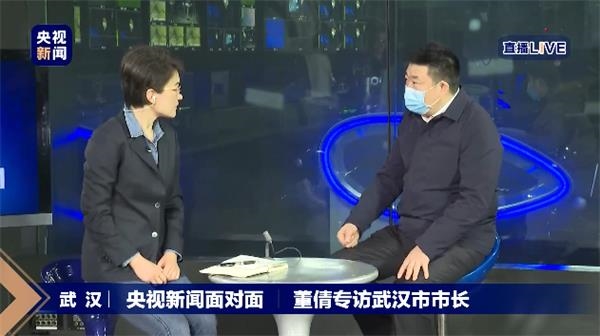
主持人:首先我在武汉直播间演播室要向大家先解释一下,也许会问:“为什么你在前方、在疫区不戴口罩”。首先我们在这个湖北电视台的演播室是经过严格的消毒,另外我也请教了专家,说在这样一个经过严格消毒的空间内,而且我确认我周围的这些同事最近都没有去过像医院还有一些危险的地方,他们都戴着口罩,因此我现在因为在直播的过程中我就不戴口罩。但是大家可以看到,坐在我身边的周市长,他是戴着口罩的。(15:10)
周先旺:因为新型冠状病毒感染的肺炎现在已经确认病情已经大面积发生人传人,我作为市长,我要把防控工作做好,我首先要带头按照专家的要求来进行必要的这种防控。包括个人的卫生习惯,个人出门要戴口罩进入公共场所要戴口罩,这是我们防控工作启动以后的一个基本要求。(15:13)
主持人:另外离汉通道关闭以来到现在已经几天的时间过去了,效果呈现出来是什么样的?(15:16)
周先旺:因为武汉市病毒性肺炎的疫源区,那么把疫源区管控好,我们就可以阻断它的继续传播。传染病的控制首先是控制传染源,武汉人少出去,在这个时候,就是对全国的贡献,就是对人类的贡献。所以我们按有关程序,做出了关闭离汉通道的决定,从目前看关闭以后,得到了武汉市民的理解,更产生了很好的效果,就是武汉人外出的大幅度下降,没有通道了,这是强制性的。那么在阻断传染源上,这个效果是非常明显的。(15:18)
主持人:我之所以问这个问题是因为当我们看到数字的时候,来自武汉、来被湖北的病例确诊人数仍然在递增,包括疑似包括医学观察的数字仍然在增长,我们怎么理解这样一个增长?(15:29)
你说的增长和我们关闭离汉通道之间,它们之间是什么关系,我跟你一下理不清楚。我们关闭离汉通道是减少武汉有可能被感染的人到外面去传染,那么对于我这个区域内已经被感染的,已经发病的,它这个存量是不会因为我的通道关闭而减少的。从流行病学发病的规律来看,我们12月27日发现首例,在溯源,到12月12日第一个病人住院,按照这个周期看现在进入高发期,所以在这个时候病人量增加。这是符合这个规律的。(15:31)
主持人:周市长,昨天我在采访一些医护人员的时候,因为机动车限行了,所以对于医护人员来讲有一个非常现实的问题,我上下班怎么办,有些医护人员可能要步行一两个小时甚至更长时间,是往返家和医院之间,有没有考虑到他们现实的出行问题?怎么解决,怎么保障他们?(15:32)
周先旺:机动车限行的目的也就是要阻断传染病,让人减少流动。因为我们要求居家观察,没有特殊情况的不要出去,没有特殊情况的也不能离开武汉,外地的人没有特殊情况也不要到武汉,就是要大家都居家观察。那么这种传染病科学家早就发现,最好的办法就是隔离,那么我们把机动车限行就是要让你不出去。(15:34)
周先旺:我们有通勤车,我们将公交车停用以后的310台大公交车分到相应的街道来管理,可以充当运输车。另外我们跟每个社区配备了3到5辆出租车,它的第一个作用就是承担你这个社区内医护人员的接送。(15:35)
主持人:他们是优先的。(15:47)
周先旺:是优先,第二就是对不方便的这些居家观察的人免费送菜、送餐,送他就医。当然了这种方式有些在对接上,在磨合上并没有达到理想状态。(15:47)
主持人:怎么讲?(15:48)
周先旺:比如我在这个社区配了三到五辆车,司机有的认为我可以帮你送菜送饭,但是发烧病人我不能运送。还有的司机因为缺少一些必要的卫生知识,要接送医生,我心中很爱他,但是我也很怕他,那我也不能送,所以这些衔接上就造成我们还有些医护人员不方便,我们目前正在对这个措施进行完善,在我们的医院的附近征用一些酒店,让这些医护人员从疲劳之中不要有到家的旅程。(15:49)
主持人:从安全角度是不是也应当这么做?(15:49)
周先旺:这样做应该是很安全的。(15:49)
主持人:就是不让这些医护人员每天通行医院和家之间,而是让他们再一个地方居住,从更安全的角度考虑是不是这样的?(15:49)
周先旺:应该是这样。(15:50)
周先旺:这些问题是逐步暴露的,暴露以后它的应对措施肯定比问题的出现要慢一些,所以这段时间我们的医护人员确实很不容易。(15:51)
主持人:这是医护人员,另外一个从广大市民的角度来说,防治疫情的扩散是重中之重,紧要的紧要,但是一些居民的客观存在的也是急迫的一种正常就医的需求,这怎么保证?(15:51)
周先旺:从出行这个角度,我们要把他正常的需求尽可能在社区能够得到满足。(15:51)
主持人:不让动尽量不让动。(15:51)
周先旺:对,刚才克强总理也跟我们强调这一点,居家观察。必要的生活用品要能得到满足,否则他就居不了,居不了就要出来,出来就会要么被感染,要么被传染。(15:52)
主持人:您说的是有发热的情况,但是还没有到那个标准,所以自己先居家观察。(15:52)
周先旺:它是这样的,这里面还没有完全说清楚,居家有发热现象的,经过发热门诊以后,发热门诊治疗还不算发热病人,只是一般的头痛发烧、一般的伤风感冒,就在家里观察观察。如果是不继续发展,按照常规的感冒的疗法好了,那就不需要去,就居家观察。还有一种就是我什么病都没有,但是整个在这里有疾病传染的危险,我就在家里哪里也不出去,在家里休息,一旦出去就有被感染的可能。所以这样我们机动车的禁行主要是起到这个作用。(15:52)
主持人:假如妇女生孩子或者老人突发的心脏的疾病,咱们怎么保证他们正常的就医需求?(15:52)
周先旺:我们社区配的这些车辆就是来解决这些的,另外我们还在补充志愿者,社区有些有私家车的把志愿者组织一个队来解决这些突发的问题。另外我们的120这些机制还是健全的,只是说现在很紧张而已。(15:54)
主持人:因为从23日到现在关闭离汉通道以后,这个决定实在是对我们外界的人来说,觉得突然,对你们身处其中的人来说,这是不是也是一个非常突然的决定?(15:55)
周先旺:是非常艰难的决定。它的突然在于这个疫情来得太突然。(15:55)
周先旺:疫情是突如其来的,洪水还有天气预报,其他的火警还有很多隐患,你们知道,我标准不到位,整改不到位,那么病毒性的这种疾病是没有预警的,没有预警突然来了,如果不采取果断措施,将不可想象,在人类史上大的传染病,黑死病、鼠疫、天花曾经对人类的威胁,使人类造成的死亡是不可想象的。那么我们今天,我们这个新型冠状病毒感染的肺炎会不会这样呢?谁也说不清楚。在这个时候只有果断的关门,关掉城门,让有可能感染的这些人封闭在这个圈里,不要再出去传染别人。封闭在这个圈里居在自己的家里,在这个城里我也不能传染别人,所以这就是封城的作用。(15:55)
主持人:其实把这个不动对于一个疾病的传染阻断来说是最好的,但对于一个特大型的城市,九省通衢的武汉来说,尤其是叠加了春运这样一个社会背景来说,对你们来说这个压力有多大?(15:56)
周先旺:我们的书记马国强同志,他是企业家出身,考虑问题比我周全,但是面对这种也可以说叫大是大非问题的时候当仁不让。一个超千万人口的城市,采取封城,他们有的说在人类史上没有,在人类的城市发展史上也没有,但是面对今天疫情的威胁,我们把这个门关了,有可能把疾病阻断了,但是在历史上我们都会留下骂名。但是我们认为只要有利于疾病的控制,只要有利于人类生命安全,马国强说我们承担什么责任都可以,因为关门人民群众对我们有意见,我们革职以谢天下,只要把疫情控制好我们都愿意。(16:14)
主持人:摆在面前的困难是什么?(16:15)
周先旺:控制思想,因为病毒性疾病病毒的威胁,按照传染病的管理不是每个人都知道的,包括我们的班子成员,也不是人人都知道,他当书记我们当市长,那么相关的我们知道,在这个时候怕造成恐慌,要把事先事情做好。(16:16)
主持人:恐慌有没有平息掉,还是多多稍稍有一定的存在,据您了解?(16:17)
周先旺:因为现在疫情都亮开了,表现的都是不变的,治病不便,出行不便,恐慌是我们不知道、无形的压力,现在大家看得清楚,感染那是个什么状况,感染目前是一种什么样的外部威胁,我觉得现在的问题不是恐惧了,因为明了了,如果说不有效面对,不斩断传染源、不控制传播途径,你就要被传染,大家清楚以后就不是恐惧了,而是怎么把这种工作做好了责任和压力了。(16:19)
主持人:如果从市民的角度,您觉得还是否存在一些对未来不确定性的心态?(16:20)
周先旺:市民总的来说很配合,因为我们关门以后,没有人说来上访,没有人说找市政府、市委要个说法,没有,很理性,很配合。但是还是有很多市民很侥幸,说这么大一个城,就传到我头上吗?所以你看上街的也还不少,在社区里面活动的也不少,不戴口罩的也不少,那么现在就是要把通过我们的宣传、通过我们的动员,让每一个市民都要知道防治这个新型冠状病毒感染的肺炎的这些措施,知道他应该怎么防的这些办法,人人参与,个个配合,那么我们这个封城才有作用。你封住了出去的,你没有管住里面的,那里面不断传播,问题也是很大的。(16:21)
主持人:我不知道您留意了没有,武汉有了疫情之后,包括关闭离汉通道,其实有一些其他的地方的人们,对于武汉出去的,或者说甚至湖北出去的,都有一些多多少少的戒备,您怎么看待这种戒备的心理?(16:22)
周先旺:这很正常,人们都追求自身的安全,一旦听说武汉这个地方有疫情,他不知道这个疫情多重,传播得有多么猛烈,他对你从这个地方来的人,他不愿意跟你接触,我认为他不仅是对武汉人,他是从武汉来的人,经过了武汉的人,他怕你带病毒。就像当年2003年北京广州非典以后全国各地也一样,我觉得这是一种正常的反应。(16:23)
主持人:您最近是一个什么样的工作状态?(16:24)
周先旺:疫情发生以后,因为疫情在不断地发展,从最初的判断,就是一般的病毒毒性不强,传播力不强,到后来第二轮说人与人之间有限性的传播,到后来是人与人之间的快速传播。所以我们的工作就不断地升级,应该说至少近十来天吧,我们都是,我们所谓的工作班子、市委、政府、包括我们各个区县相关的部门,这些同志都是连轴转。(16:24)
主持人:应当说这次突发性的公共卫生的危机,包括政府的治理各方面运行都是一个很大的考验,怎么去面对这种巨大的考验?(16:25)
周先旺:严峻的考验,我们武汉战胜过很多这样的考验,比如1954年的大洪水,1998年的大洪水,2003年的非典,2016年大洪水,其实我们有战胜困难的勇气,也有战胜困难的干部队伍,但是对战胜这种病毒性的困难,大家有一个认识过程。那么这次武汉的这种病毒性肺炎的威胁,它很像2003年北京加广州的压力。2003年非典疫源在广州,重灾区在北京,今年疫源在武汉重灾区在武汉,所以面对这种突如其来的大家压力都很大。特别是医疗资源,武汉市也是全国特别重要的医学中心,在这方面能力好于很多城市,但是面对一下突如其来的这么大的传染病的资源的需求,就捉襟见肘了,所以各方面的矛盾就充分暴露了。那么在这个时候,市委政府的班子大家毫无疑问都背负着巨大的压力,所以这种连轴转,而且还转得不好,这些问题就出现了。(16:26)
主持人:您为什么刚才讲连轴转还转得不好?(16:27)
周先旺:我感觉我们应对危机的能力,我们的这些公共卫生事件应对的这些办法还需要很好的完善。这就正如习总书记提出的要实现我们治理能力和治理体系的现代化,治理能力的现代化很重要一块就是我们的危机层面的管理,对突发事件的管理,我们这方面能力还需要提高。(16:27)
主持人:周市长非常感谢您的坦诚。刚才您说到,武汉即便具备了跟其他城市相比相对富余的这么一种资源,但是面对这么巨大的危机的时候,还是捉襟见肘,这个时候您觉得各方面的来的物资够不够,您觉得还需要什么?(16:28)
周先旺:它是肯定不够的,如果一个城市的常态能够应付这么大的疫情,那你这个城市新增的这些财富就不能用于发展和改善民生,你不可能按照这么大的疫情来配备公共资源,这是不可能的,我想在任何一个城市、任何一个国家,包括发达国家,它也是不可能的。(16:28)
主持人:您说的是自身面对是不够的,但是这个时候四面八方的人和物资来了,来支援来了,截止到目前为止,来的这些医生护士其他支援够不够?(16:29)
周先旺:在这一点上确实作为一个中国人,作为中国共产党领导下的一个中国公民,确实感觉幸福,我们灾情一发生,党中央、国务院、中央军委高度重视,习总书记第一时间做出批示,全国各地的资源向武汉集中,所以我们紧缺的防护衣、N95的口罩和护目镜以及其他的一些耗材,从全国各地就运来了。如果不是这些支援,我们可能很多病人就得不到及时救治,就不是在院治疗了,有可能永远的就告别这个世界了。(16:30)
主持人:周市长,其实全国人民都希望你们,刚才您也说了,做出一个在治理能力方面做出一个很好的应对,另外一个在不断地学习中能够不断提升。但是大家也很期待,你们怎么能够得到既及时又准确的信息?能够让你们做出一个正确的判断?(16:31)
周先旺:这次我们的疫情其实各方面对我们信息的披露是不满意的,我们既有披露不及时的一面,也有我们利用很多有效信息来完善我们的工作不到位的一面。前面这个披露的不及时,这一点大家要理解,因为它是传染病,传染病有传染病防治法,它必须依法披露,作为地方政府,我获得这个信息以后,授权以后,我才能披露,所以这一点在当时很多不理解。后来特别是元月20日,国务院召开常务会议,确定了这个病作为乙类传染病,并进行甲类传染病的管理,而且要求属地负责,从这之后,我们认为我们的工作就主动多了。而且在很多方面的一些强硬的措施上,不是慢半拍,那是可以说是硬了一拍,比如说关闭离汉通道的问题,暂停我们的城市的地铁、公交、轮渡,包括武汉出去的长途公交车,这是很果断的。(16:32)
周先旺:但是把这些措施采取以后,你整个城市功能就发生了变化,人们的衣食住行、这种服务都发生了改变,这就很多就跟不上来了。(16:32)
主持人:明白,非常感谢周市长,因为我知道您近期的工作节奏一定系是非常快的,听您的声音已经感到嘶哑了,希望您保住身体,以力再战。希望武汉不仅仅各个方面的医护人员的支持,其实还需要各方来的心理方面的安慰,要知道我们要阻断的是病毒,但是要阻断的不是人与人之间的亲情。(16:33)
主持人:您对于武汉市民的表现怎么样?(16:34)
周先旺:我觉得武汉人非常棒,武汉人担当识大局,封闭一座城为全国人民的健康和全国人民的生命安全奉献,这是一种大爱、大义、大气。(16:34)
(文章来源:央视新闻)
(责任编辑:DF070)郑重声明:东方财富网发布此信息的目的在于传播更多信息,与本站立场无关。已有69人评论, 共273304人参与讨论我来说两句…举报分享到:
网友评论69人评论

登录 | 注册表情发布清除郑重声明:用户在社区发表的所有资料、言论等仅代表个人观点,与本网站立场无关,不对您构成任何投资建议。用户应基于自己的独立判断,自行决定证券投资并承担相应风险。 《服务条款》《跟帖评论自律管理承诺书》最赞评论查看全部评论
股友CDRsrS:2020-01-27 15:52:02不作为的干部 167 回复
不翻倍不娶妻:2020-01-27 15:57:29这个市长下课吧,能力有问题 142 回复
风再雨龙翅:2020-01-27 15:59:03虽然是天灾,,但有人祸,,你必须担责,,,, 98 回复全部评论查看全部评论273537人参与 | 评论69条 |
果实是金:2020-01-27 15:38:34市长这种口罩管用吗 16 回复
俊才郎:2020-01-27 15:39:44周市长,辛苦了,武汉人民永远不会忘记你的! 59 回复
超微微散对冲菜金:2020-01-27 15:42:22应该管用,看样子就是平时医院看到医生使用的医用一次性口罩 1 回复
股友zaOTG1:2020-01-27 15:42:44向主持人致敬! 13 回复
股友zaOTG1:2020-01-27 15:43:04主持人懂得尊重观众! 23 回复
Victory2020:2020-01-27 15:43:09请你了解一下这个人再评论 34 回复
深圳游资操盘手:2020-01-27 15:44:49周市长是低调的实干领导大家支持一下人家!别动不动就黑别人 40 回复
股友zaOTG1:2020-01-27 15:45:53我们的主持人更像名勇敢战士 18 回复
寡人寻爱妃御妻:2020-01-27 15:46:22压着不报,是谁的行为? 64 回复
lchblx:2020-01-27 15:46:27武汉加油!市长不容易。疫情爆发发展人类认识有一个过程。大家共同努力!

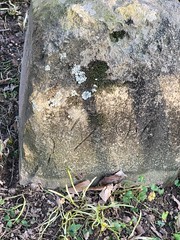
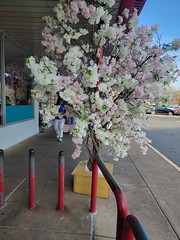
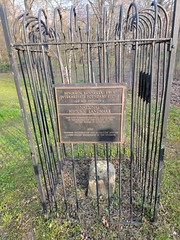
Pingback: Editor's note for Monday, January 27, 2020 | | TimesDirect.TV
Pingback: What the coronavirus crisis tells us about Chinese governance – travel
Pingback: What the coronavirus crisis tells us about Chinese governance – Financial Times – HOME OF LATEST
Pingback: China’s Early COVID-19 Missteps Have an All-Too-Mundane Explanation - taktik(z) Staging
Pingback: Live News posts on Amazon, USA, world, and business
Pingback: China’s Early COVID-19 Missteps Have an All-Too-Mundane Explanation – travel
Pingback: China’s Early COVID-19 Missteps Have an All-Too-Mundane Explanation - GEORIVISTA
Pingback: China’s Early COVID-19 Missteps Have an All-Too-Mundane Explanation – The Diplomat
Pingback: 2020: Gao Falin — The Great Damage Done by PRC Secrecy | 高大伟 David Cowhig's Translation Blog